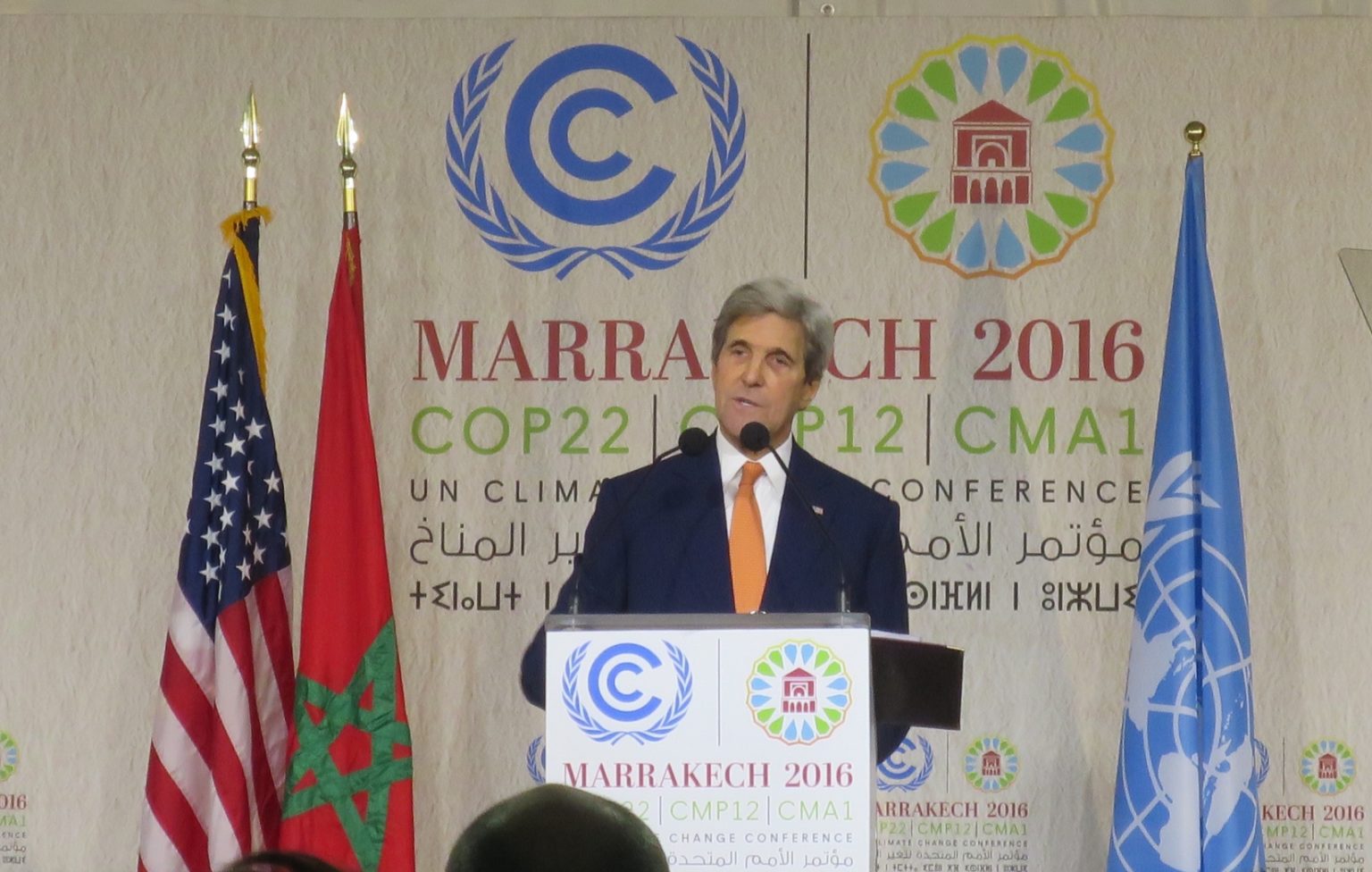Today at the latest round of United Nations climate talks in Marrakech, Morocco, the nonprofit Corporate Accountability International (CAI) was finally able to deliver a petition to the U.S. delegation calling for the removal of corporate interests and the fossil fuel industry from the international climate negotiations process.
The petition included a demand for the U.S. to stop opposing a conflict of interest policy that would look to limit the influence fossil fuels groups could have on the talks.
Later that day, U.S. Secretary of State John Kerry criticized the continued use of fossil fuels — with a careful caveat about carbon capture and storage technology — saying at this point, the world cannot “write a big fat check enabling the widespread development of the dirtiest source of fuel in an outdated way. It just doesn’t make sense. That’s suicide.”
The CIA petition is calling out organizations such as the World Coal Association, International Emissions Trading Association (IETA), and BusinessEurope, which represent major oil, gas, and coal companies from across the world and which are given “observer” status at the UN climate summit.
What does that mean? For starters, this allows them to sit in on the closed-door meetings where UN delegates hammer out the details of addressing the issues caused by emissions coming from many of these same companies.
However, yesterday when CAI first attempted to deliver the petition representing more than 625,000 people, mostly Americans, the U.S. delegation refused to officially receive or acknowledge the petition.
“We certainly caught them off guard,” Jesse Bragg, Media Director for CAI, told DeSmog. “They brought us into the press office to keep us away from the public view, and it was very clear that they didn’t have a protocol to deal with this.”
It wasn’t until nearly seven hours later that Emily White, of the U.S. State Department, told CAI she would accept the petition the following day.
Corporate Accountability International eventually was able to deliver the petition to the U.S. State Department. Credit: Corporate Accountability International
Conflicts Over Conflict of Interest
During a May 2016 round of UN climate talks in Bonn, Germany, the first to follow the historic Paris Agreement in December 2015, the governments of Venezuela and Ecuador raised the conflicts of interest issue.
As Bloomberg BNA reported at the time:
“But as talks wound down, the language that would have created a mandate to gather information on how other UN entities and multilateral processes handle their own conflict-of-interest issues was removed, based on suggestions from the U.S. and the European Union.
Conflict-of-interest rules would limit the role that organizations that stand in opposition to the goal of the process—such as large fossil fuel energy companies—can play within the process.”
A technical glitch prevented Ecuador, representing a group of developing nations and the majority of the global population, from successfully reintroducing the language on conflicts of interest.
The International Emissions Trading Association (IETA) declares the Marrakech climate talks “Open for Business.” Credit: Ashley Braun, DeSmog
Here in Marrakech, governments and environmental groups are reissuing the call for the UN climate talks to reconcile this earlier failure to address conflicts of interest.
“Too much is at stake to continue allowing the world’s biggest polluters and their agents to undermine this process,” said Walter Schuldt, lead negotiator for the government of Ecuador, in a statement. “This process is our best shot at saving our planet, we cannot leave that responsibility up to the industries and their corporate powers that got us here.”
In addition to having nearly unfettered access to negotiators, corporations and trade organizations acting on behalf of the fossil fuel industry are also sponsoring the overall meeting, hosting side events during the talks, and displaying slick booths touting their green credentials in an exhibition hall outside of the main talks.
Bragg referred to this exhibition hall filled with glossy, high-tech corporate displays as a “trade show,” expressing his disappointment with how the amount of space for these displays at climate talks has been growing relative to those allotted for civil society groups.
Coal Reps at Climate Talks
The World Coal Association says it is attending the UN climate talks to encourage higher efficiency coal plants and carbon capture and storage technologies — which received a special call-out from Sec. Kerry — as solutions that nations should embrace in their national plans to reduce emissions.
In a statement on its website, the head of the World Coal Association, Benjamin Sporton, said that “coal is not the problem, emissions are,” and went on calling for the continued investment in coal power infrastructure.
“We need to ensure older, less efficient power stations are replaced with modern, more efficient ones,” Sporton said.
However, this vision for a low-carbon future does not match those coming from scientific reports — or precisely from Sec. Kerry, who called high-carbon energy sources such as coal “one of the costliest and most foolhardy investments right now.”
In addition, according to scientific analyses from environmental group Oil Change International, the world must stop constructing all new fossil fuel projects and phase out early some oil and gas fields and coal mines in order to meet the Paris Agreement target of limiting global warming to well below 2 degrees Celsius.
The French multinational energy corporation Engie’s booth at the Marrakech climate talks. Engie is a part of the natural gas industry. Credit: Ashley Braun, DeSmog
At past UN climate talks, such as in Cancun, Mexico, in 2010 and in Poznań, Poland, in 2008, a representative from Shell actually served as part of the Nigerian and Brazilian delegations, respectively.
Despite these conflicting views for how nations can achieve the Paris Agreement goals, Sporton and representatives from BusinessEurope, French energy conglomerate Engie, and other groups with track records of obstruction on climate action continue to be welcomed without restraint at the UN climate talks.
Neither the U.S. State Department nor the World Coal Association responded to requests for comment on each one’s respective position on the adoption of a conflict of interest policy at these talks.
Meanwhile, the group Corporate Europe Observatory claimed today that the European Union’s lead climate negotiator Miguel Arias Cañete and Maroš Šefčovič, Vice President of the European Commission, have favored meeting with business lobbyists over public interest groups during their tenure.
Oil and gas companies such as BP and Shell were among the top ten businesses the pair held meetings with, but all of that top ten were in some way linked to the gas industry.
Tamar Lawrence-Samuel, of Corporate Accountability International who backed the report, said: “Big Tobacco wrote the playbook on using closed-door meetings and back-room deals to manipulate policymakers. It shouldn’t come as any surprise that Big Oil, Gas, and Coal use the same strategies to undermine EU climate policy.”
Tobacco Lobby-Free Talks
Coincidentally, at the same time as the climate talks are happening in Marrakech, a parallel UN treaty meeting aimed at controlling the health impacts of tobacco is occurring in Delhi, India.
In that process, nations, including Australia, pushed for a strong conflict of interest policy to minimize the influence of the tobacco industry on their work.
The treaty associated with those talks states “there is a fundamental and irreconcilable conflict between the tobacco industry’s interests and public health policy interests.”
Yet at the Bonn talks, Australia notably opposed the inclusion of a report on conflicts of interest in the UN’s climate process.
Bragg, of CIA, added: “Obviously the government itself understands the importance of protecting public health policy from the tobacco industry. Why does that not translate to the fossil fuel industry for climate policy?”
Main image credit: Ashley Braun, DeSmog
Subscribe to our newsletter
Stay up to date with DeSmog news and alerts







